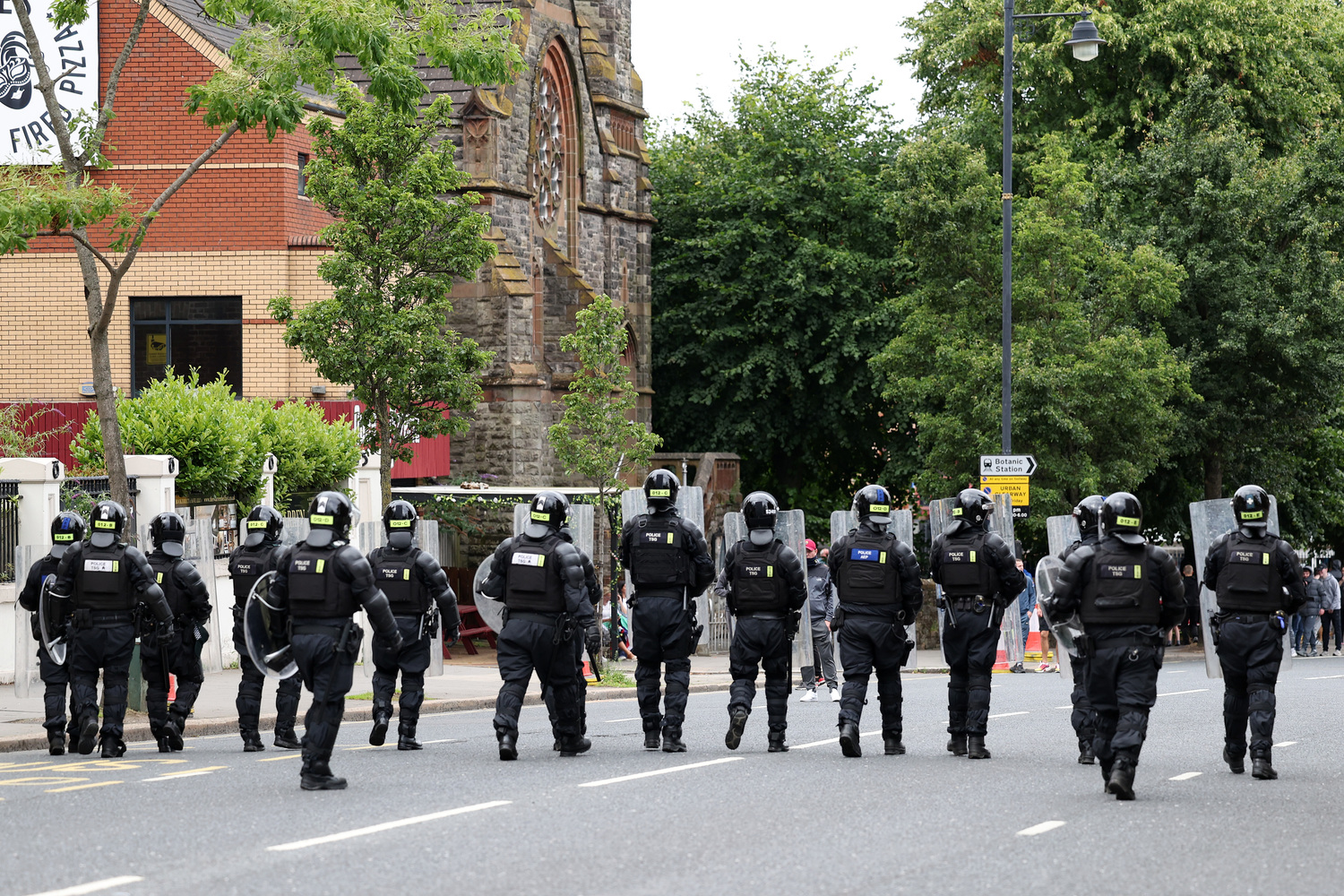
Police and protesters in a stand-off in south Belfast. Almost half those arrested had previously been reported for domestic abuse. Photograph by Declan Roughan, Press Eye
Almost half those arrested for race hate disorder in Belfast last August had previously been reported to the PSNI for domestic abuse, The Detail can reveal.
The police data, obtained through a freedom of information (FOI) request, highlights a significant overlap between public violent disorder and domestic violence.
Sonya McMullan, regional services manager at Women’s Aid Federation Northern Ireland, said the figures were unfortunately not surprising.
“These displays of public violence and disorder on our streets were meant to be a reaction to violence against women and girls, yet those who were creating this disorder themselves had histories of domestic abuse,” she said.
The murder of three children in Southport at the end of July 2024 sparked riots in south Belfast and in towns and cities across England.
Far-right activists and social media accounts often justified violent protests as a reaction to wanting to protect women and children.
Seven businesses in Sandy Row, Donegall Road and Botanic were sacked in targeted attacks by rioters following a far-right anti-immigrant march on August 3 2024.
In the following days, unrest and attacks on the homes and businesses of those from ethnic minority backgrounds continued.
There were 48 people arrested in relation to the disorder, of which 23 had been reported for domestic abuse. The figures for Northern Ireland – 48% - were higher than the UK average (41%).
Groups working with women in Northern Ireland said that the figures showing high rates of race rioters with histories of domestic abuse here were not surprising.
“The figures are extremely important to highlight, because they show what we in the women's movement have said from the start; that violence and racism did not stem from a righteous revulsion at violence against women and girls,” said Elaine Crory, from the Women’s Resource and Development Agency (WRDA).
“From the very start, the violence itself made victims of more women and girls and destroyed people's homes and their sense of safety - all hallmarks of domestic abuse offenders.
“Politicians who give cover to this kind of argument really need to face this and seek to understand how their language can actually lead to justifying violence against women and girls. Ideally, they should withdraw their comments and endeavour to learn from experts in the field.”
Women’s Aid told a parliamentary committee last year that PSNI statistics – which already show domestic abuse accounting for 1 in 5 of all crime – are only the “tip of the iceberg in terms of the epidemic that domestic abuse is in our society.”
Ms McMullan, from Women’s Aid NI, said there is a normalisation of violence on our streets, as well as against women.
“In Northern Ireland we are a society coming out of conflict, a society experiencing inter-generational trauma and over the years have seen a normalisation of violence on our streets, Ms McMullan said.
“It is clear that these latest outbursts of public disorder caused intimidation and fear within communities and caused many to have to leave their homes.
“The issue of violence against women and girls in Northern Ireland is at crisis point, we need to act now, resource services appropriately, manage the issue of serial, repeat offenders and hold them to account to keep everyone safe on the streets and behind closed doors.”
Some of those arrested were children – the youngest being just 11 years old.
Most of the children and young people engaged in the disorder were not previously known to the police, according to internal documents from a multi-agency meeting at the time, obtained through a separate FOI request.
The document states that the PSNI were “concerned about extremism, radicalisation and exploitation of children”, while the Department Of Justice’s Youth Justice Agency “advised when (we) dig into radicalisation (we) often find other vulnerabilities like domestic circumstance.”
Nic Murray contributed reporting
 By
By